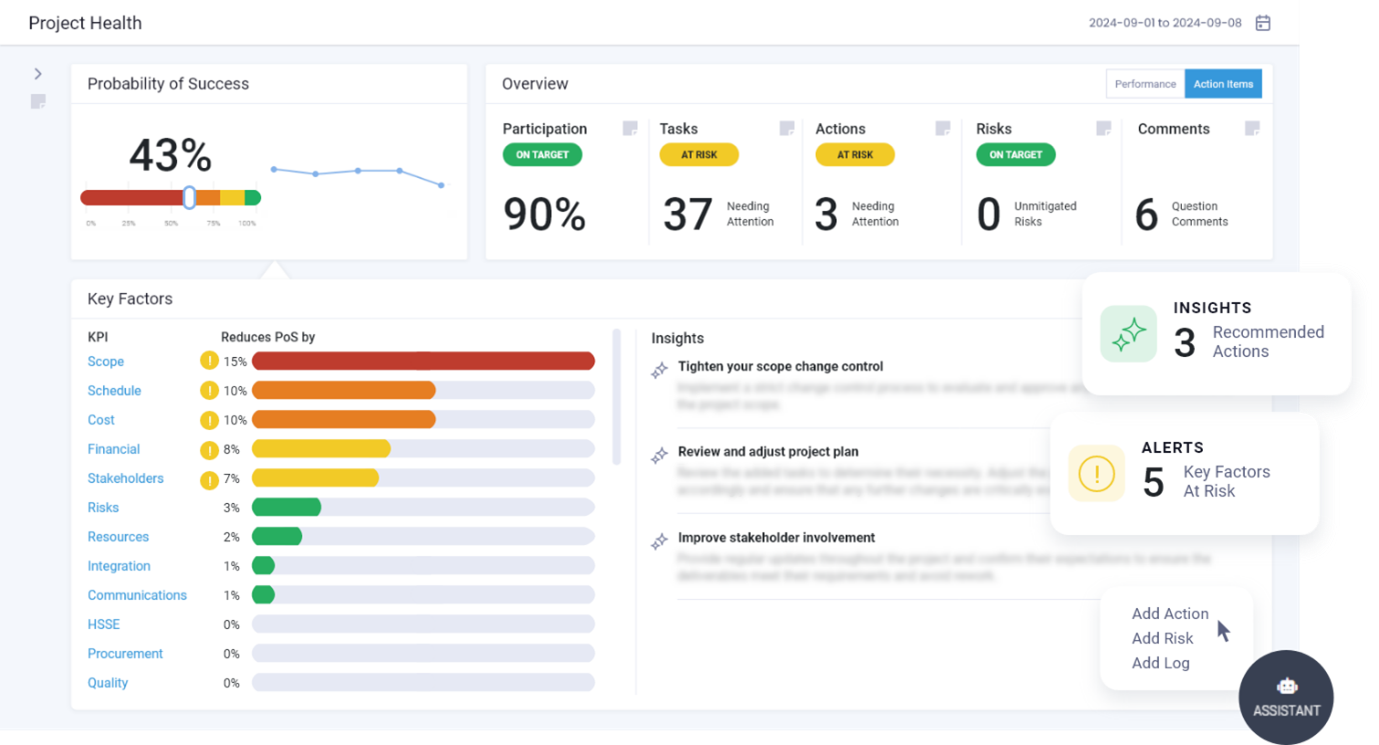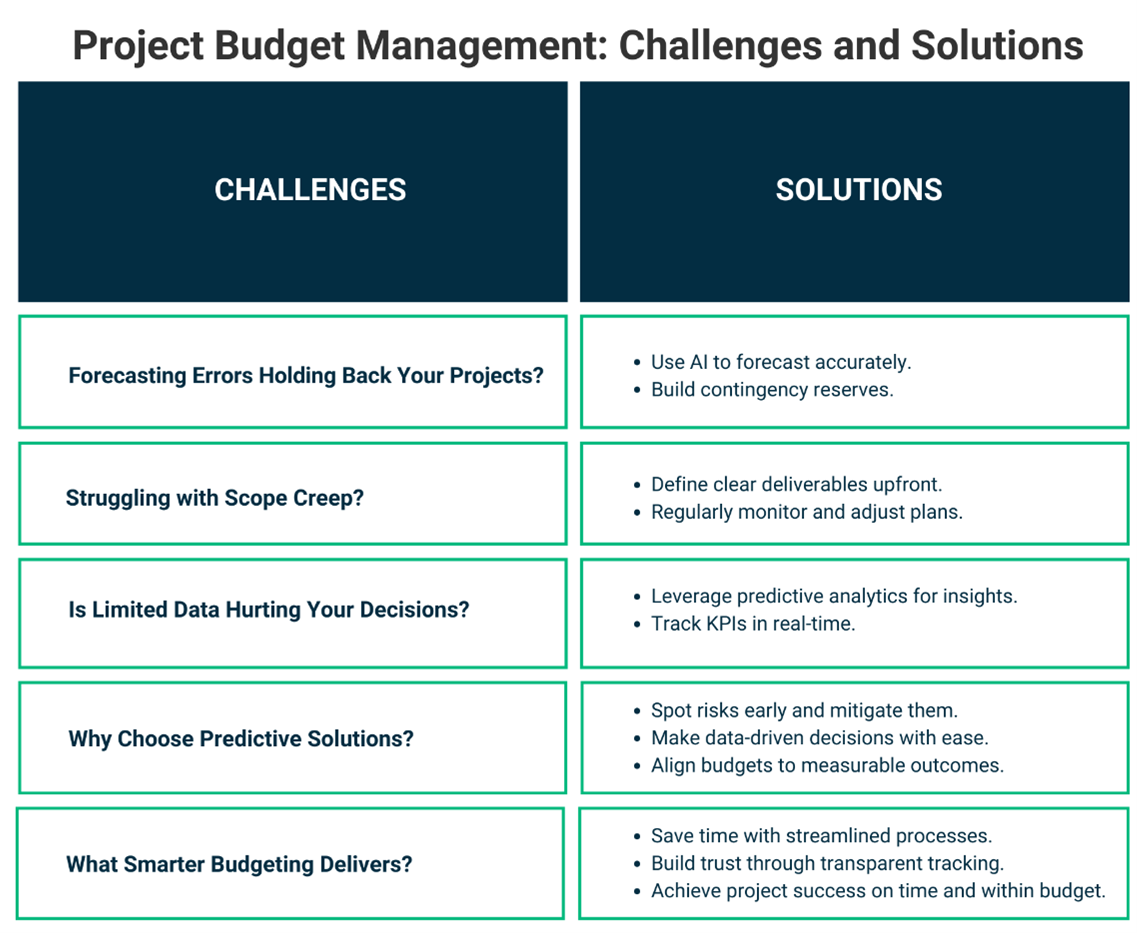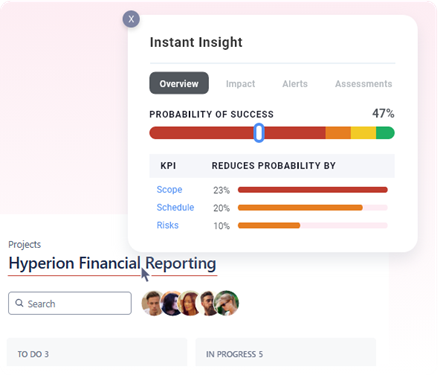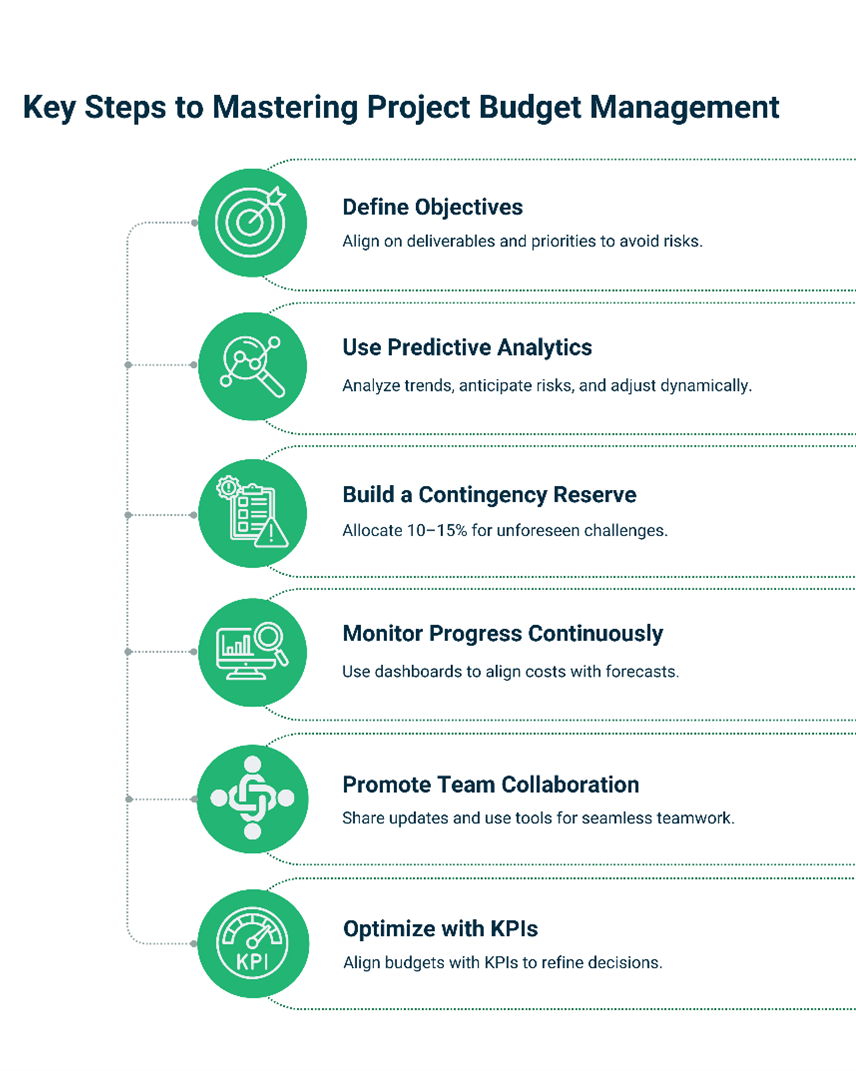
What happens when a project’s financial foundation collapses? The outcomes are predictable - timelines stretch, resources are wasted, teams lose morale, and goals remain unfulfilled. For project leaders, budget planning isn’t just a routine task—it’s a non-negotiable strategic function.
A well-structured budget doesn’t just allocate resources; it serves as a proactive tool for mitigating risks, aligning priorities, and enabling confident decision-making. Without it, even the most ambitious projects can falter under unforeseen costs and inefficiencies.
This article dives into actionable strategies to overcome common budgeting challenges, from building resilient financial frameworks to leveraging predictive tools that transform how budgets are planned and managed.
Additionally, we’ll explore how predictive insights empower leaders to anticipate challenges, dynamically adjust resources, and maintain seamless execution. With these tools, budget planning evolves from reactive problem-solving to a forward-looking strategy that drives project success.

Why Budget Planning Is Non-Negotiable
Every successful project begins with a clear financial foundation. Budget planning isn’t just about balancing numbers; it’s the compass that guides resources, mitigates risks, and aligns objectives with execution. Without it, even the most skilled teams can lose direction, leading to inefficiencies and compromised outcomes.
Here’s why budget planning is an indispensable element of project success:
- Ensures Alignment - A thoughtfully crafted budget ties resources directly to project priorities, eliminating guesswork and keeping teams and stakeholders on the same page.
- Builds Confidence - Transparent financial planning fosters trust, making collaboration smoother and decision-making faster.
- Enhances Resilience - A strong budget acts as a buffer against uncertainties, enabling projects to adapt and thrive in the face of unexpected changes.
Budget planning doesn’t just set the stage for execution—it shapes the outcomes. It gives leaders the tools to preempt challenges and seize opportunities, transforming potential obstacles into growth avenues. Beyond these core functions, a well-planned budget opens doors to:
- Cost Optimization - Identifying and eliminating inefficiencies to maximize financial impact.
- Strategic Innovation - Allocating resources toward forward-thinking initiatives that drive long-term value.
In today’s fast-paced, resource-sensitive environments, budget planning is no longer optional. It’s the difference between reactive problem-solving and proactive project leadership—a vital skill that enables leaders to navigate complexities and deliver results.

Challenges in Budget Planning
Budget planning is the cornerstone of project success, yet even seasoned leaders face hurdles that can derail progress. While the process seems straightforward on paper, the reality is far more complex. Addressing these challenges head-on is critical to building a budget that not only works but thrives under pressure.
The Key Challenges Leaders Face:
- Unrealistic Forecasting - One of the most common pitfalls is relying on incomplete or overly optimistic estimates. Failing to account for hidden costs or unexpected changes often leads to budget overruns and hasty reallocations that compromise project goals.
- Scope Creep - Projects rarely remain static. Without mechanisms to adapt budgets to evolving requirements, even minor changes can cause significant financial strain, pulling resources away from essential tasks.
- Fragmented Communication - Effective budget planning requires alignment across teams and stakeholders. Miscommunication or delayed approvals can create bottlenecks, wasting time and increasing costs.
- Data Gaps - Many budgets are built using historical data alone, but past performance doesn’t always predict future challenges. A lack of predictive insights makes it harder to foresee risks and proactively manage them.
- Resistance to Change - Introducing new tools and processes often meets internal pushback. Teams accustomed to traditional methods may struggle to embrace predictive tools or advanced analytics, limiting the organization’s ability to innovate.

Want to see predictive intelligence in action?
Watch this short video to explore how TrueProject helps teams anticipate risks and make smarter budgeting decisions.
Bridging the Gap with Predictive Intelligence
While these challenges are significant, they are not insurmountable. Predictive intelligence tools are emerging as a game-changer in budget planning. By analyzing patterns and trends, these tools offer foresight into potential risks, enabling leaders to adjust before issues escalate. For example -
- Predictive insights can highlight early warning signs of scope creep, allowing teams to recalibrate resources without disrupting project timelines.
- Real-time dashboards provide transparency, improving communication and ensuring stakeholders remain aligned throughout the project lifecycle.
- Advanced analytics bridge data gaps by combining historical performance with forward-looking scenarios, empowering leaders to make informed decisions.
A Path to Smarter Budget Planning
Recognizing and addressing these challenges is the first step toward smarter budget planning. By integrating predictive tools into the process, organizations can move beyond reactive strategies and embrace a more dynamic, resilient approach to financial management. Predictive intelligence doesn’t replace traditional methods—it enhances them, creating a framework for proactive decision-making and sustained success.
Strategies for Elevating Budget Planning
Budget planning isn’t a one-size-fits-all process. It requires thoughtful strategies that balance immediate needs with long-term objectives. By combining proven methods with modern innovations like predictive intelligence, leaders can create budgets that are not only accurate but adaptable to real-world challenges.
Here’s how you can take your budget planning to the next level:
- Define Objectives and Scope Early – Effective budgeting starts with clarity. Establishing well-defined objectives and scope ensures resources are aligned with the project’s core priorities.
- Collaborate with Stakeholders - Bring key players together to set expectations and create a shared vision.
- Identify Deliverables and Milestones - Break down the project into actionable steps with clear financial implications.
- Set Realistic Timelines and Costs - Avoid overpromising by grounding estimates in current market conditions and team capabilities.
By setting these parameters early, you create a foundation for accountability and precision, reducing the risk of missteps down the line.
- Use Historical Data Strategically - Historical data is a treasure trove of insights, offering lessons that can inform better decision-making.
- Benchmark Costs and Timelines - Use past projects as reference points to set realistic expectations.
- Spot Patterns and Pitfalls - Identify trends in overspending or delays to avoid repeating mistakes.
- Refine Forecasting Accuracy - Combine historical insights with current data to improve the reliability of your predictions.
While historical data provides valuable context, its true power lies in its integration with predictive analytics. By combining past insights with forward-looking tools, leaders can bridge the gap between what has been and what could be.
- Adopt Predictive Analytics Tools - Predictive tools like TrueProject transform budgeting from a static process into a dynamic, data-driven strategy. They allow you to stay ahead of risks and adjust your approach in real time.
- Highlight Risks Early - Predictive insights identify potential cost overruns before they become critical.
- Enable Dynamic Adjustments - Real-time data empowers teams to reallocate resources as needs evolve.
- Provide Actionable Insights - Advanced analytics offer clarity, helping leaders make informed decisions that align with both short- and long-term goals.

By embracing predictive analytics, organizations move from reactive problem-solving to proactive planning, ensuring their budgets remain resilient in the face of uncertainty.
- Build Contingency Reserves - No budget is immune to unexpected events. Setting aside 10-15% as a contingency fund ensures your project can adapt without compromising its objectives.
- Manage Delays and Shortages - Contingencies provide the flexibility to handle resource gaps or supply chain disruptions.
- Adapt to Scope Changes - Projects often evolve; a contingency allows you to address these changes without derailing your plan.
- Think of contingency reserves as your financial safety net—a proactive measure that prepares your team for the unpredictable.
- Monitor and Adapt Continuously - Budgeting isn’t a set-it-and-forget-it process. Ongoing monitoring and adjustments are crucial for maintaining alignment with project goals.
- Utilize Real-Time Dashboards - Visual tools provide up-to-date insights into financial performance.
- Compare Costs to Forecasts - Regular reviews ensure spending remains on track and highlight areas needing adjustment.
- Reallocate Resources Proactively - Address emerging needs before they escalate into larger issues.
Predictive tools further enhance this process by offering real-time updates and alerts, enabling leaders to adapt quickly and confidently.

Curious about the power of predictive insights?
Schedule a discussion with our experts to learn how TrueProject can strengthen your project’s financial foundation.
Why Predictive Insights Are a Game-Changer
Traditional budgeting methods often address problems only after they arise, leaving projects vulnerable to delays and cost overruns. Predictive insights are transforming this approach, enabling leaders to anticipate challenges and act with precision.
How Predictive Insights Elevate Budget Planning
- Forecast with Precision - By analyzing real-time data and trends, predictive tools offer highly accurate estimates, ensuring budgets are realistic and adaptable.
- Spot Risks Early - Predictive analytics identify potential disruptions before they escalate, empowering teams to mitigate risks proactively and stay on track.
- Enhance Team Collaboration - Shared dashboards ensure transparency across stakeholders, fostering alignment and faster decision-making.
Predictive solutions like TrueProject integrate these capabilities seamlessly, enabling leaders to transform budgeting from a reactive task into a forward-looking strategy.
The Competitive Edge of Predictive Intelligence
By bridging the gap between historical data and future scenarios, predictive insights allow organizations to confidently navigate uncertainty. They don’t replace traditional budgeting—they enhance it, offering a proactive approach that ensures projects are delivered on time and within scope.
Predictive intelligence is not just an innovation; it’s a necessity in today’s fast-paced, complex project environments. With these tools, budget planning evolves from a static process to a dynamic advantage, empowering teams to drive consistent success.

Take control of your project finances with TrueProject.
Request a demo today to experience predictive insights that simplify budgeting and mitigate risks early.
Unlocking New Opportunities in Budget Planning
Budget planning is often seen as a method of controlling costs and allocating resources. But it’s also a gateway to uncovering hidden opportunities that can elevate project success. Leaders can go beyond traditional approaches and add tangible value by adopting a strategic lens.
Three Strategies to Unlock Potential
- Scenario Planning - Testing various financial assumptions prepares you for the unexpected. It helps leaders assess how changes in scope, timelines, or market conditions may impact budgets, ensuring they’re ready to adapt. Predictive insights enhance this process by simulating accurate outcomes and identifying risks early.
- Cross-functional Engagement - Involving diverse teams ensures that budgeting decisions reflect real-world perspectives. Collaboration fosters department alignment, highlights overlooked priorities and builds stronger stakeholder trust. Predictive tools make this engagement seamless by consolidating data into one shared, transparent platform.
- KPI Integration - Tying budgets to key performance indicators ensures every dollar contributes to measurable success. By aligning financial planning with strategic goals, leaders can monitor progress in real-time and adjust allocations proactively. Predictive analytics refines this process, offering actionable insights to keep projects on track.

See how scenario planning can transform your budget strategy.
Get started with TrueProject’s QuickStart Plan to unlock immediate value for your team.
The Advantage of Proactive Project Planning
Budget planning, when supported by predictive tools, becomes a strategic advantage. It empowers leaders to optimize resources, foster team collaboration, and achieve project goals with greater accuracy. This approach mitigates risks while unlocking potential for sustained success and innovation.
Budgeting isn’t just about controlling costs—it’s the foundation of successful project management. When done right, it provides clarity, aligns teams, and turns financial decisions into drivers of success. Predictive intelligence enables leaders to foresee risks, adapt in real-time, and keep projects on track—not by reacting to problems, but by preventing them altogether.
This is where TrueProject steps in. TrueProject is a predictive project management SaaS solution that uses KPI-based intelligence and advanced warnings to deliver what spreadsheets, guesswork, and conventional tools never can—real-time visibility and foresight.
By continuously monitoring project performance, TrueProject detects early signs of cost overruns, resource misallocations, and timeline risks before they escalate. Its AI-powered insights help teams adapt budgets proactively, ensuring every financial decision aligns with actual project conditions. No more surprises. No more reactive firefighting. Just smarter, sharper budget control.
Unlike tools that rely on static historical data, TrueProject applies predictive analytics to anticipate challenges before they surface. It empowers leaders to make decisions rooted in real-time project dynamics, not outdated reports. The result? Budgets that stay intact, teams that stay aligned, and projects that finish within scope and budget—without last-minute chaos.
Want to see how TrueProject can transform your budget planning into a strategic advantage? Request a demo today.






